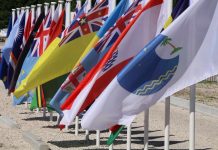By Patrick Kaiku
Solomon Islands Prime Minister Manasseh Sogavare recently affirmed his country’s adherence to the “friend to all, enemy to none” foreign policy ideal. He, like other Melanesian leaders, in aligning their interests within the great power competition between the United States and China, will walk a fine line – not wanting to be seen favouring one over the other.
However, the fact is that in communities across the region, geopolitical rivalry does not register as important. Melanesian states are otherwise preoccupied, mostly with domestic nation-building efforts and development priorities. Melanesians may see, for instance, the presence of Chinese retailers or read news stories about the latest bilateral commitments from traditional development partners, but these issues are rarely viewed through the lens of “strategic competition”.
What is not helpful is how Sino-American rivalry is framed as a binary, zero-sum contest, with the intention of persuading Melanesian states to take sides. Much of the misunderstanding in the last decade can be attributed to how Melanesians are often lumped into the U/S-defined “Indo-Pacific”, even though much of their trade is now more than ever with China.
In Solomon Islands, the decision to switch diplomatic ties from Taiwan to mainland China has been seen as uninformed by any domestic debate.
Geopolitical competition is not a subject of conversation in Melanesian communities. It is in this void that the narrative of geopolitical rivalry, framed outside of the sub-region, informs misguided approaches in dealing with Melanesian states. Not helpful too is the fact that Melanesian officials tasked with conducting statecraft on behalf of Melanesian states are never accountable to the citizenry.
Foreign affairs remain the exclusive domain of Executive governments in Melanesian countries. For instance, Patrick Matbob observes that in Papua New Guinea, people “have little knowledge or concern about PNG’s foreign relations…The country’s citizens remain largely spectators to the government’s international relationships and dealings”.
Occasionally, unpopular foreign policy decisions will trigger political instability or override the sovereign constitutions of Melanesian states. The PNG Supreme Court ruling in 2016 on the unconstitutional status of the Manus Island asylum-seeker facility is a case in point. In Solomon Islands, the decision to switch diplomatic ties from Taiwan to mainland China has been seen as uninformed by any domestic debate, resulting in tensions between Sogavare and then premier of Malaita province, Daniel Suidani.
Notwithstanding the democratic deficit in their foreign relations, shrewd political leaders in Melanesia demonstrate agency. Geopolitical rivalry is proving useful for leveraging developmental assistance and other associated diplomatic objectives. For the most part, Melanesian governments are about accessing development assistance for the domestic constituency through this rivalry.
Melanesian states are open to a range of development partners, both traditional and new. The strategic positions taken by Melanesian governments are the justification for their non-aligned, friend to all, enemy to none principles. Vanuatu and PNG, for instance, are members of the non-aligned movement. Openly courting a diverse range of development partners is simply a method of leveraging international relations for domestic needs. It does not limit them to just one set of partners in the international system.
It is worth noting that universalist principles are found in the Melanesian understanding of social relationships. The “adversarial” notion of pitting parties against each other or having to choose sides in a confrontation is problematic in certain Melanesian societies. Some of the founders of Melanesian states were mediators or peacemakers in their communities. When they took over the running of the affairs of state, mediating differences in these artificial nation-states in Melanesia allowed them to hone their leadership credentials.
There is benefit in Melanesian states playing the mediator role in relationships with competing powers.
The late Sir Michael Somare proved adept at navigating a diverse nation in its pre-independence period, leading it into today’s PNG. It was under Somare’s premiership that PNG’s friend to all, enemy to none foreign policy orientation was coined in 1975. What this demonstrates is that Melanesian governments are simply acting like Melanesian societies. The imposition of a binary strategic competition is therefore something some Melanesian states may not find consistent with their own understanding of relationships. For small states, the default position is neutrality and non-alignment. Taking sides in geopolitical confrontations is a luxury big states can take.
Henry Ivarature, commenting on Solomon Islands, stated that: China is seen as a friend. It is not an enemy or a hostile country. It is viewed as a country that has something to offer to the government and people of Solomon Islands that may advance their wellbeing.
The unprecedented focus and presence of great powers in Melanesia, and the fact that China and other powers are going to be permanent features of the landscape, means it is important that Melanesians engage extensively with all partners. Reflecting on the motivations of Solomon Islands in its security agreement with China, Tarcisius Kabutaulaka said “China is relatively new to the region and countries such as Solomon Islands must build deep knowledge about Beijing, state and non-state agencies, Chinese people and how they operate. Similarly, China (and other development partners) need to nurture deep and nuanced knowledge about island countries.”
Melanesian states, through the Melanesian Spearhead Group, can also proactively go out of their way to communicate their viewpoints and common positions to external partners. A common Melanesian Public Diplomacy Strategy is a useful way to enable continuous dialogue and people-to-people interactions. There is benefit in Melanesian states playing the mediator role in relationships with competing powers. This is part of the Melanesian Way that has not been communicated thus far in the foreign relations of Melanesian states.
SOURCE: DEVPOLICY.ORG/PACNEWS


















